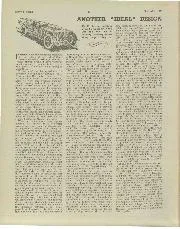
ANOTHER "IDEAL" DESIGN
ANOTHER " IDEAL" DESIGN M. E. Nixon outlines what he wants after the war—and how he is actually building something approaching it. INSPIRED by the invitation extended by the Editor…
When a new series for 2-litre sports- prototypes was announced for the 1970 season, Lola had a hunch that it was going to be a success. So it set out on the design of a new car that would play a starring role in a largely forgotten — and ultimately short-lived – yet golden period of sports car racing.
The result of the British constructor’s efforts was the T210 Group 6 contender. This car and its close derivative for 1971, the T212, battled for supremacy in the new European 2-Litre Sports Car Championship for Makes with the machines built by its rival from up north, Chevron.
Lola came out on top over the two-year lifespan of the T210/212 design. It claimed the drivers’ championship both times, with Jo Bonnier and Helmut Marko respectively, and the makes’ crown in the second of those years. In 1970, however, Chevron took the end-of-season silverware for manufacturers. Just. It only prevailed at the last corner of the last lap of the nine-event series.
There was nothing trick about the new car designed by Lola founder Eric Broadley and his head of drawing office Bob Marston. It was instead an entirely conventional machine with the ubiquitous 1.8-litre Cosworth FVC engine in the back of a monocoque chassis design, unlike its sparring partners produced up in Bolton.
Not only was the open-topped Lola stiffer than the spaceframe Chevron B16, but it was also crucially lighter than its coupé rival, plus it came with ventilated discs front and rear. Chevron driver Brian Redman might have prevailed over Bonnier in the inaugural European 2-Litre series round at Paul Ricard in April 1970, but he knew that he faced an uphill battle against the Lolas.
Formula 1 driver Bonnier, who was also Lola’s European importer, triumphed almost every time he appeared in the series following the Paul Ricard opener – and he might even have won that but for engine issues late on. Bonnier’s form across the remainder of 1970 eventually forced Chevron’s hand. By the end of the year, Redman had at his disposal a new weapon, the lighter B16 Spyder that served as the template for the following year’s B19, and took victory in Belgium after his Swedish rival half-spun at La Source as they tried to out-brake each other.
“Helmut Marko’s results helped Lola get revenge on Chevron”
The T212 was only a light upgrade on its successful predecessor. There was revised bodywork reflecting alterations in the regulations, new rear uprights and repositioned oil coolers. So similar were the two cars that Lola continued the run of chassis numbers from the ’70 machine into its replacement, although with a difference: T210s were prefixed ‘SL’ after the Slough factory in which they were built. T212s were called ‘HU’s after the company headed over to Huntingdon for bigger premises in the winter of 1971/’72.
The ‘new’ cars from Lola and Chevron shared eight wins across the 1971 season – five for Lola to Chevron’s three – with Marko taking three of Lola’s haul for Karl von Wendt’s BG Racing team. The consistency of the man who now controls Red Bull’s driver development programme helped Lola to get its revenge on Chevron in the makes’ points.
Today the 36 T210s and T212s built in period — and some modern recreations — can race in Peter Auto’s Classic Endurance Racing series, the FIA Masters Historic Sports Car Championship and the Historic Sports Car Club’s Thundersports Series. They aren’t for every historic racer, however. The short-wheelbase design isn’t as forgiving as the Chevrons against which it still races.
Lola came up with an all-new 2-litre prototype, the T290, for 1972, designed by two young men who would go on to have big futures in our sport, Patrick Head and John Barnard. Chevron evolved the B19 into the B21, and the battles between two legendary marques continued.
• Price new n/a
• Price now £185,000-£250,000
• Engine Ford Cosworth FVC
• Rivals Chevron B16, B16S and B19, Abarth SP2000
• Verdict A minor classic of the sports car world that was a success on the race track and in the marketplace